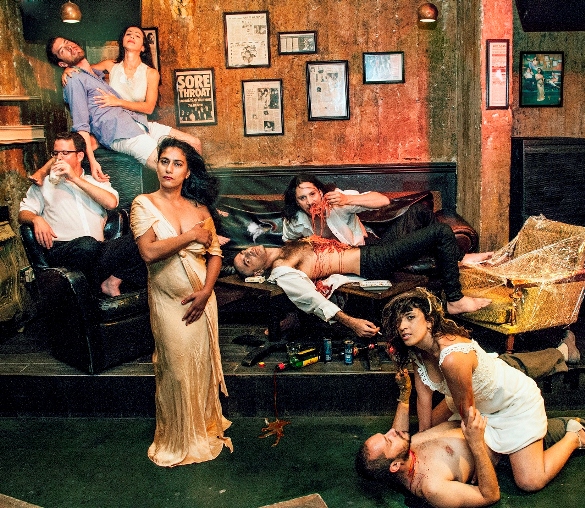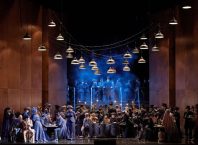In Greek tragedy the violence always takes place offstage. Ran Bechor and Roee Hertz Rousso, working with the imagery, symbols, characters and associations of Greek tragedy, explore the space between life and death in which these horrific acts of violence remain suspended. In Greek mythology, the river Styx flows between the land of the living and Hades, the realm of the dead. In their original, experimental work Offstage, Bechor and Rousso imagine these aporias of Greek tragedy, the offstage scenes of violence, flowing eternally on this river, never finding closure or resolution. Offstage will premiere at the Acco Festival of Alternative Israeli Theatre , with performances from September 21 – 24, 2013. Midnight East visited Offstage in rehearsal and conversed with Ran Bechor and cast members Lelia Gormezano and Aviv Levi.

Offstage is ambitious in concept and scale. Working with the images and characters of six plays (Sophocles’ Oedipus the King; Aeschylus’ The Libation Bearers; Euripides’ Iphigenia in Aulis, The Trojan Women, Bacchae, and Medea), a cast of 11 performing actors and 10 recorded actors, Bechor describes the play as a “journey” for the audience, using the word figuratively and in its most literal sense. Making use of the unique venue, the Crypt in the Knight’s Halls of the Old City of Acco, with its atmosphere laden underground rooms and passageways, the audience will be led by guides, in a contemporary interpretation of a Greek chorus, through an unconventional theatrical narrative.
Seeing Offstage in rehearsal was an intense and intriguing experience in many ways. Lelia and Aviv performed a scene between Clytemnestra and Orestes, based on the storyline of The Libation Bearers by Aeschylus. In Aeschylus’ play, Orestes has returned from his long exile to avenge the murder of his father, Agamemnon; the cycle of violence goes back to Agamemnon’s sacrifice of his daughter Iphigenia at the onset of the Trojan War. Upon Agamemnon’s return from the war, his wife Clytemnestra murders him in retribution for Iphigenia’s death. The encounter between Clytemnestra and Orestes is bound to be tense and fateful.
Watching Lelia and Aviv prepare for their scene was a rare moment, the rapport between the actors is palpable, and they imbue their preparations with a sense of ritual, simple tasks taking on a sense of solemnity and beauty. Although they portray the characters of Clytemnestra and Orestes, the dialogue (written by Ran Bechor and Roee Hertz Rousso) is in some sense independent of the Greek original, it is a conversation between an estranged mother and son, utterly contemporary as it covers the difficult terrain between parent and child, the minefields of memory and emotion, touching on the small moments of daily life with precision and pain. Ran had warned me that the scene is one of the most violent and difficult to endure – for audience and actors, his warning is accurate. It’s a powerful scene, harrowing and visceral, it is hard to watch the tender and intimate relationship of tormentor and victim without flinching. It is a scene that provokes thought and suggests connections to the contemporary reality in Israel – which is the dramatist/directors’ intention.
“All these images, these offstage images, become embedded within our culture,” Ran said to me between scene runs as we sat on the sidelines, “the mythic impacts the concrete reality. What happens when you give image and voice to that which is absent?”
In giving expression to those scenes that took place offstage in Greek tragedy, Bechor and Hertz Rousso would like to use artistic means to explore the political reality. As Ran Bechor stated, relating Offstage to the Israeli political context, “What does our culture want to place offstage? What is absent and suppressed in public discourse and the media? We would like to research that space between that which is placed front and center, and that which is hidden and suppressed.”
Offstage will be performed at the Acco Festival of Alternative Israeli Theatre, under the artistic direction of Gil Alon. The full festival program is available in English, online via the festival website, and tickets may be ordered online. Please note: Offstage is not suitable for children.
Offstage
Created by: Ran Bechor & Roee Hertz Rousso
Performing actors: Lelia Gormezano, Yara Jarrar, Nitay Juran, Dror Kedem, Alit Kreiz, Aviv Levi, Uri Levin, Lital Nimrod, Samira Saraya, Nihad Radah, Lavi Guli Matos; Recorded cast: Eitan Carmeli, Sharon Rosenbaum, Dana Yitzhaki, Uri Gov, Danielle Belinki, Tamar Segal, Paul Mamran, Tomer Lev-Tov, Avital Tidhar, Amit Riess; Space design: Chemda Natan & Hamutal Tsiolkovsky; Costumes: Hamutal Tsiolkovsky; Original music: Anastasia Sadomski; Sound: Benya Reches; Asst. director: Yael Katzman; Production: Ronit Straschnow; Lighting Designer: Guy Galili; P.R.: Aviva Zimmerman; Thanks to: the “Beit Cherner” Community Center, Jaffa; Yael Dokarker, Dr. Daphna Ben-Shaul, Ira Avneri, Natalie Zuckerman, my beloved Ruthy Russo, and the Puncture Group; Special thanks to: Mr. Hanan Azulay. NOTE: This program is not intended for children
Photo: Sigal Segev, Photo adaptation: Zohar Ron





